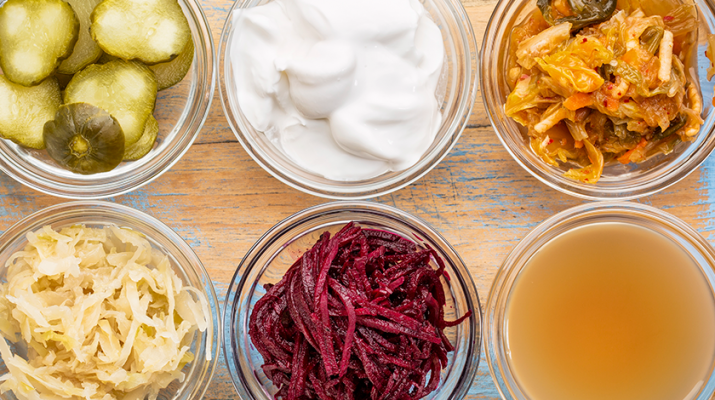Gut bacteria play crucial role in keeping healthy
By Jana Eisenberg

You’ve probably heard that fermented foods are good for you. You may even know it’s got something to do with the millions of bacteria living in your gut — in all of our guts.
Those little critters collectively referred to as our microbiome help keep us healthy. But did you ever wonder why, and why it might be important?
Here’s a helpful scientific summary from the blog “Science Based Medicine,” by Lucy Shewell: “The bacteria in fermented dairy and vegetables [are hardy enough to] survive their perilous journey through the digestive tract. Once they are there, it’s clear that [the bacteria] have at least some positive effects on human health, ranging from the enhanced nutritional contents of the foods themselves, to alleviation of inflammatory bowel conditions, to restoring normal gut microbiota after antibiotics, to enhancement of the immune system, and possibly even weight loss.”
We all need healthy gut bacteria to help us live, but our lifestyle and environments might be working against us. The overuse of antibiotics — medications that are supposed to kill “bad’ bacteria, in both humans and the animals we eat — can negatively affect our gut biome. In addition, our mostly indoor lifestyles, with a hyper-emphasis on sanitizing things, can have a negative effect.
“Adding in low-sugar fermented foods is important and good for your health and immunity,” said Jennifer Jennings, owner, CEO and medical director at Cardea Health Integrative in East Aurora. “Fermented foods have a plethora of benefits as they contain living microbes that can support immunity and a healthy microbiome. People who lack a diverse microbiome may have symptoms of intestinal dysfunction.”
“Sources of fermented foods include both plant-based and animal-based sources,” she added. “Some common examples include yogurt, kefir (water or dairy), miso, sauerkraut, dark chocolate, pickles, kimchi, kombucha and raw cheese.”
Fermentation frenzy
Certified plant-based chef Jessica Meyers Altman also is a proponent of a healthy microbiome supported by eating a broad variety of foods, including fermented ones. “Fermenting is an ancient preservation process. As we’ve moved away from traditional diets and food preparation, research shows that, for example, newer methods of preserving foods are impacting gut biome,” said Altman, who’s also an adjunct professor at Daemen College in Amherst.
In fact, there’s a rise in younger people being diagnosed with colorectal cancers, thought in part due to the fact these generations were generally brought up eating more highly processed foods, going out to eat more often, and not being in the habit of preparing meals at home from scratch.
“Consuming fermented foods, with their naturally occurring bacteria, can help reestablish healthy microbiome,” said Altman.
Since a salt-based brine is used in the fermenting process, Altman cautions those on reduced salt diets for medical conditions to be aware of the sodium levels.
People can have a healthy microbiome without eating any fermented foods, agree the experts, since eating plenty of high-fiber foods, called prebiotics, can help keep your gut bacteria healthy as well. Prebiotics — including many raw vegetables, alliums (onions, garlic, scallions, etc. — are even better for you when they come from foods that are organically grown and minimally processed without using harmful chemicals.
“Adding in prebiotic rich foods is especially helpful in feeding the ‘good bacteria’ in our microbiome, aiding in proliferation and communication amongst them,” said Jennings.
“Many ‘Western’ diseases, like Type 2 diabetes, some cancers, obesity, inflammatory and cardiovascular conditions, can be prevented with diet and lifestyle changes. Traveling — being exposed to different bacteria in different environments — helps vary your biome,” said Altman. “It’s good for people to get out and play in the dirt; that’s not ‘dirty’ the same way that potentially harmful germs, say in a dirty bathroom, are. The degradation of our microbiome has led to us being generally less healthy.”
Bacteria make up around 3 percent of our mass; they outnumber human cells in the body by 10 to 1. So be nice to them, and eat foods that help them stay healthy and flourish — and they’ll do the same for you.
Certified plant-based chef Jessica Meyers Altman: “Consuming fermented foods, with their naturally occurring bacteria, can help reestablish healthy microbiome,” she says.

